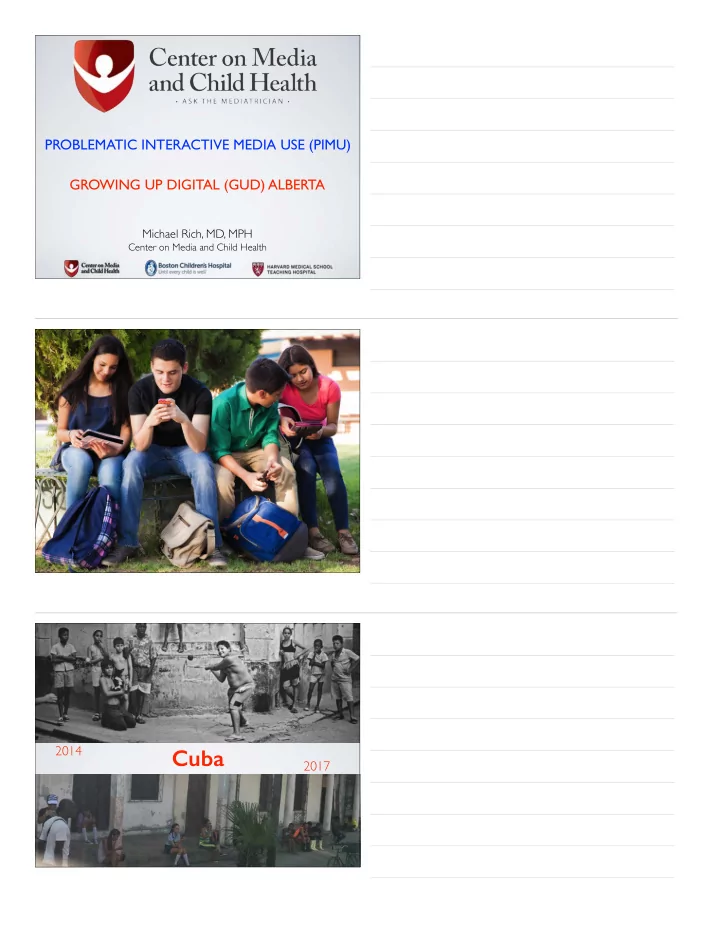

PROBLEMATIC INTERACTIVE MEDIA USE (PIMU) GROWING UP DIGITAL (GUD) ALBERTA Michael Rich, MD, MPH Center on Media and Child Health 2014 Cuba 2017
Just released from hospital ADHD Declining grades Stopped playing soccer Falling asleep in school Stole money, used credit cards Sent to boarding school Lost devices, took others’ Expelled from boarding school Parents took router out *Matthew Matthew drank bleach * name and photo changed 97% 0-4 year olds use mobile devices Most 2 year olds used mobile device daily 70% for parent chores, 65% to calm, 29% to put child to sleep WHY DO PEDIATRICIANS DISCOURAGE TV UNDER 2? • Human brain embryonic at birth • Demand forms connections • Disuse results in pruning Human interaction Acting on the physical environment Free play and creative problem-solving No learning occurs with TV viewing under 30 months Sources: Rideout 2011, Anderson 2005, Council 2013
92% ONLINE EVERY DAY 24% CONSTANTLY ADOLESCENCE 2018 Why are teens always looking at screens? Media provide a fertile environment for adolescent development Experience
Independence Social Consciousness Identity
Connection 2 billion/month Found online porn at 9, got in trouble for it Academic high achiever, not so good in sports Uses porn to satisfy sexual needs Avoids social events Feels unsure around girls, unsure of himself and of his interest in women *Patrick * name and photo changed Prefrontal cortex - executive functions are last to mature Attention, impulse control, self-regulation
TWEENS (8-12) USE MEDIA FOR JUST UNDER 6 HOURS/DAY (5:55) LED BY TV, GAMES TEENS (13-18) FOR JUST UNDER 9 HOURS/DAY (8:56) LED BY TV, MUSIC Multitask ~1/3 of the time = Exposed to 11:45 of content Source: Rideout 2010 *Ian * name and photo changed Phase 1
ALL media are educational WHAT WE FEED A CHILD’S MIND i s as important as what we feed her body Fear/Anxiety Victim Desensitization Bystanders Increased aggression Bully
Relative Strength of Correlations CAN THERE BE TOO MUCH MEDIA TIME? 23% Fair/Poor Grades 47% 16% Get in trouble a lot 33% 10% Low personal contentment 20% 0 13 25 38 50 Source: Rideout 2010
Complaining of insomnia Uses smartphone as alarm Social anxiety Active on Instagram, Snap Feels alone Started sending nude selfies Suicidal online friend whom she texts Was cyberbullied, *Uma then cyberbullied others * name and photo changed Less sleep Poorer sleep Always online FOMO and self-defense...
Phase 2
>90% teens and parents carry smartphones 72% teens, 48% parents must respond immediately 41% teens, >3/4 parents feel the other is distracted Is connectivity undermining our connectedness? DISTRACTED PARENTING 73% parents used devices while eating with children 20% fewer verbal, 39% fewer nonverbal interactions 30% time parents distracted by screens Their kids >3x more likely to take risks > 200,000 medical visits for playground injuries Source: Radesky 2014, Krevskaya 2015
What happens when devices are turned off? 1,000 college students, 5 continents, 24 hours “I literally did not know what to do with myself.” UK “I didn’t use my cell phone all night. It was a horrible day. I CAN’T LIVE WITHOUT MEDIA!” Chile “I felt lonely as if I was in a small cage on an island.” China “Sometimes I felt dead.” Argentina “Media is my drug; without it I was lost. I am an addict. How could I survive 24 hours without it?” UK “I was itching, like a crackhead, because I could not use my phone.” USA Source: Moeller 2012 What is Addiction? Stigma Behavioral Physiology Addictions Punishment What is Addiction?
Video Game Addiction Internet Addiction Disorder Internet Gaming Disorder Gaming Disorder 4 types: gaming, social media, porn, info-bingeing Problematic Interactive Media Use (PIMU) CMCH.tv/CIMAID What if we turned our devices off? 1,000 college students, 5 continents, 24 hours off Reflections “It was an unpleasant surprise to realize that I am in a constant state of distraction.” Mexico “When you really get off the media, you realize how many quality things you can do.” Lebanon “I interacted with my parents more than usual.” Mexico “I’ve lived with my best friends for 3 years - this is one of the best days we’ve spent together. I was able to really see them, without any distractions, and we were able to revert to simple pleasures.” USA Source: Moeller 2012
Self? Creativity? Brain Mapping GUD ALBERTA Phase 3 Work with industry to incorporate public health and child development science into R&D
Instead of developing a killer app… Be balanced Be mindful Be present! Develop your Killer Be Our Mission: T o educate and empower children and caregivers to create and consume media in ways that optimize children’s health Investigate T ranslate Innovate Conduct, collect and Educate and empower Develop media tools & methods that promote health analyze research children and families www.cmch.tv
Recommend
More recommend